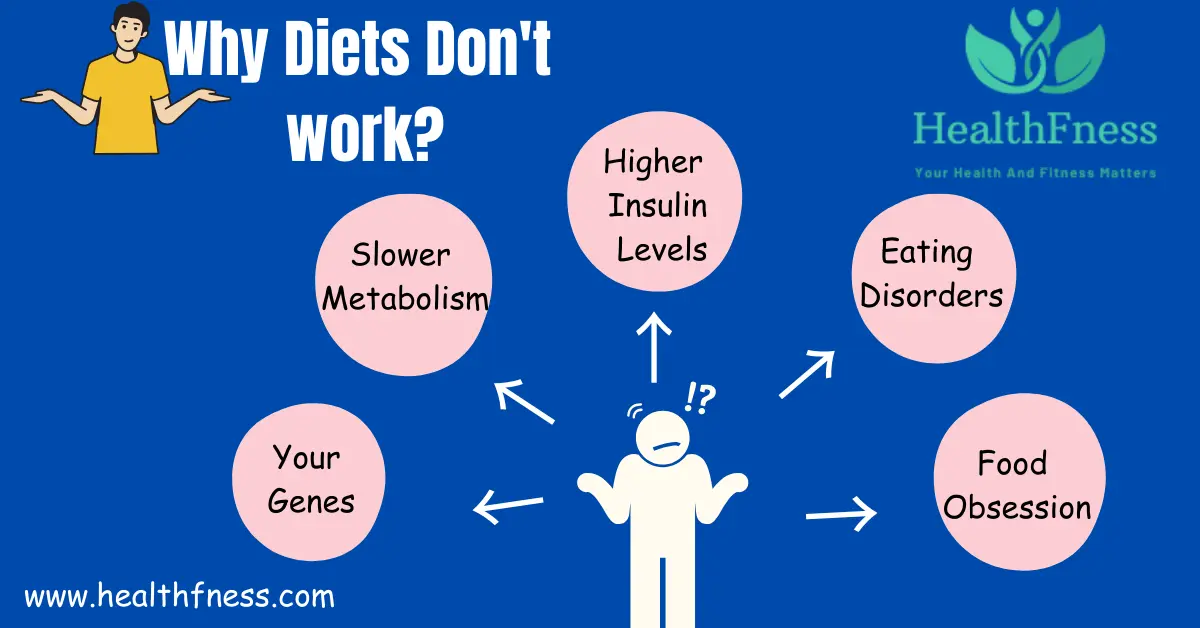Introduction
Eating disorders are serious mental health conditions that can have a significant impact on a person’s quality of life. They involve disordered eating patterns that are often driven by a distorted body image or negative emotions. These disorders can cause physical and psychological distress, as well as long-term damage to the body if left untreated. It means we should treat it as soon as possible now the question arises how can we identify that we are suffering from an eating disorder?🧐
Symptoms
This Disorder is characterized by an abnormal relationship with food, which can manifest in a variety of ways. People who suffer from these disorders may exhibit physical, behavioral, and emotional symptoms. 😰
Physical symptoms of these disorders can include:
– Significant and rapid weight loss or gain
– Abnormal heart rate or blood pressure🥴
– Fatigue
– Dizziness 😵
– Dry skin or brittle nails
– Gastrointestinal problems
Behavioral symptoms of these disorders can include:
– Severe restriction of food intake
– Avoiding meals and activities that involve eating
– Excessive exercise
– Hiding food
– Engaging in repetitive rituals before eating🫣
– Refusal to eat around others
Emotional symptoms of these disorders can include:
– Low self-esteem
– Feelings of shame or guilt related to eating
– Fear of gaining weight
– Difficulty expressing emotions
– Irritability or anxiety
– Obsession with body image🫠
Types of Eating disorders
Eating disorders are one of the most serious mental health conditions affecting millions of people each year. They can have a devastating impact on physical and mental health and cause long-term damage if not properly addressed. These disorders fall into three categories:
- Anorexia Nervosa
- Bulimia Nervosa
- Binge eating disorder
Anorexia Nervosa
Anorexia Nervosa is characterized by a distorted body image and extreme fear of gaining weight or becoming fat. People who suffer from anorexia exhibit extreme dietary restrictions and extreme exercise regimes in an attempt to control their weight.
Bulimia Nervosa
Bulimia Nervosa is characterized by periods of binge eating followed by compensatory behaviors such as purging, fasting, or excessive exercise. Unlike anorexia, people with bulimia do not typically display severe weight loss.
Binge Eating Disorder (BED)
Binge Eating Disorder (BED) is characterized by recurrent episodes of unrestrained and compulsive eating. Unlike bulimia, individuals with BED do not engage in compensatory behaviors afterward. This type of disorder leads to feelings of guilt and shame, as well as rapid weight gain.
You May Also Like To Read: Bipolar Disorder: Symptoms, Treatment, Medication (2023)
Treatment of the eating disorder
There are a variety of treatments available for this disorder, including:
Psychotherapy
Psychotherapy is an important component of treatment for these disorders. Therapy can help individuals identify unhealthy thought patterns and behaviors related to their disorder, and learn how to replace them with healthy coping skills. Therapy can also provide individuals with support and guidance as they adjust to healthier eating habits.

Medical intervention
Medical intervention is also important in the treatment of eating disorders. In severe cases, hospitalization may be necessary in order to ensure proper nutrition and address any physical complications that may have arisen from the disorder. For example, medical professionals may prescribe vitamins or other medications to help address nutrient deficiencies or medical complications such as kidney failure.
Survival Rate
Eating disorders are one of the most serious mental health conditions affecting millions of people each year. They can have a devastating impact on physical and mental health and cause long-term damage if not properly addressed. This disorder is a complex illness that manifests from a range of biological, psychological, and environmental factors.
The best way to treat people with this disorder
Dealing with someone who is suffering from an eating disorder can be difficult and overwhelming, but there are a few things you can do to help.
- The first step is to educate yourself about the disorder↗. Eating disorders can be complex illnesses and it is important to have a basic understanding of the disorder in order to provide proper support.
- The next step is to be supportive and non-judgmental. It is important to remember that the individual is not at fault for their disorder and is likely struggling with feelings of guilt and shame.
- It is also important to be aware of triggering language or behaviors. These disorders can be exacerbated by certain phrases or actions.
- Lastly, it is important to encourage the individual to seek professional help. Eating disorders can be very serious and treatment is necessary in order to ensure proper recovery.
Eating disorders, disordered eating, and body image research in New Zealand
The forestallment and treatment of eating diseases rely on an expansive body of exploration that includes colorful foci and methodologies. This scoping review linked applicable studies of eating diseases↗, body image, and disordered eating with New Zealand samples; charted the methodologies.
Methods
Using scoping review methodology, two databases were searched for studies examining eating diseases, disordered eating, or body image with New Zealand samples. Snowball styles were further used to identify fresh applicable papers that didn’t appear in original quests. Two independent pundits screened the titles and objectification of 473 records.
Result
The eligible studies examined a variety of eating complaint orders including binge-eating complaints, bulimia nervosa, and anorexia nervosa, in addition to disordered eating behaviors and body image in nonclinical or community samples. Methodologies included treatment trials, secondary analysis of datasets,non-treatment experimental interventions.
Conclusion of research
This study provides a comprehensive and detailed overview of the exploration into eating diseases and body image in New Zealand while pressing important considerations for both original and transnational exploration.
FAQS:
Can an eating disorder cause diabetes?
Eating disorder has been identified as a risk factor in the development of type 2 diabetes. To reduce this risk, it is important to focus on healthy eating habits and regular physical activity. In addition, nutritional counseling and support from healthcare professionals are also recommended for individuals who have these disorders.
How do eating disorders affect mental health?
Eating disorders can have severe and damaging effects on mental health. Studies have linked these disorders to increased risk for depression, anxiety, low self-esteem, substance abuse, and suicidal thoughts. Additionally, having this disorder can also cause significant stress and strain on individuals' relationships.
Is there a cure for an eating disorder?
While there is no single “cure” for eating disorders, there are many effective treatments available. The most common treatment for this disorder is cognitive-behavioral therapy, which helps individuals understand and modify their thoughts, feelings, and behavior patterns related to food.
Is an eating disorder an addiction?
Some experts believe that eating disorders can be an addiction, as they involve behaviors that could be considered compulsive or obsessive. This disorder involves focused attention on thoughts, feelings, and behaviors related to food, which can often become persistent and difficult to control.
What eating disorder is most common in males?
The most common this disorder among males is binge eating disorder. Binge eating disorder is characterized by a pattern of uncontrolled eating, accompanied by feelings of guilt and shame. Other types of these disorders, such as anorexia nervosa and bulimia nervosa, are more commonly seen in females than in males.
Is an eating disorder genetic?
There is evidence to suggest that some cases of eating disorders may have a genetic component. Studies have shown that biological siblings of individuals with anorexia nervosa are more likely to develop the disorder, suggesting a heritable component. In addition, certain gene variants have been identified that may increase the risk for this disorder.
Are eating disorder treatments effective?
Yes, treatments for eating disorders can be very effective in helping individuals manage their symptoms and regain a healthy relationship with food.
Conclusion:
Eating disorders can be a complex and difficult condition to tackle, but treatment can be successful with the help of mental health professionals, along with support from family members and friends. Talk therapy, medications, nutritional counseling, and other forms of support are typically used to treat these disorders.
Video Credits:

Dr. Mark Jenkins, MD - General Physician (California, USA)
Dr. Mark Jenkins is a board-certified general physician based in the United States, specializing in preventive medicine, nutrition, and lifestyle health. With years of clinical experience in primary care, he is dedicated to helping patients and readers alike make informed, science-based decisions about their well-being.
As a trusted medical reviewer and contributor to Healthfness.com, Dr. Jenkins ensures that all health content meets the highest standards of accuracy, safety, and evidence-based medicine. His expertise bridges modern medical science with practical, everyday wellness strategies, making complex topics approachable for all audiences.
Outside the clinic, Dr. Jenkins is passionate about living the healthy lifestyle he teaches. He enjoys hiking with his dog, experimenting with vegetarian cooking, and exploring the latest health research. He believes that small, consistent lifestyle changes lead to lasting health improvements, and he aims to inspire readers to take proactive steps toward a healthier, happier life.
Explore more of Dr. Jenkins’ evidence-based insights at Healthfness.com



